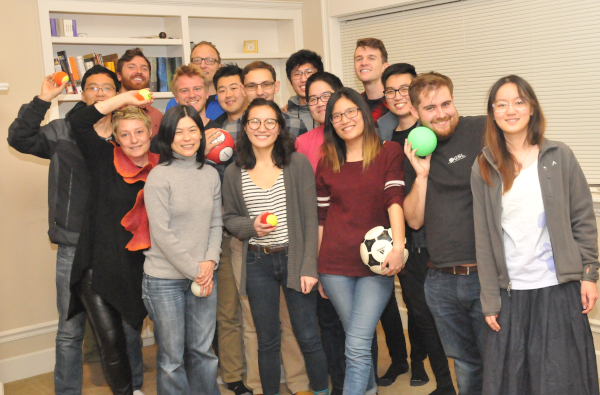Meilyn Sylvestre, a UW Bioengineering Ph.D. student, has received a two-year peer-reviewed grant from the United States Department of Defense (DoD) to support her pursuit of targeted nanotherapies for brain cancer.
The DoD Horizon Award provides $150,000 to support her research in developing novel approaches to treat glioblastoma, the most common form of brain cancer and among the deadliest of all cancers. The award is part of the DoD Peer Reviewed Cancer Research Program to support innovative, high-impact cancer research, with brain cancer a topic area designated for study by Congress.
Meilyn is mentored by Professor Suzie Pun, whose research program focuses on developing drug delivery technologies in a number of areas, including targeted drug delivery to the central nervous system.
Crossing the blood-brain barrier
Glioblastomas are known for being aggressive, diffusing their way into healthy brain tissue unpredictably and mutating rapidly, making both surgery and treatments a challenge.
One of the hurdles researchers face in delivering drugs directly to glioblastoma cells is the blood-brain barrier, which prevents the uncontrolled passage of substances from the blood into the brain. In her DoD-funded project, Meilyn is assessing various mechanisms of transport across the blood-brain barrier and the subsequent effects on tumors, both in cell culture models and in live animals.
“Specifically, I am investigating how manipulating the internal pH of endosomes – internal cellular vesicles that bring externally bound substrates inside the cell – can direct downstream sorting processes,” she says. This could be significant for designing future therapies, cancer-related or not, that can cross the blood-brain barrier to access the brain and deliver drugs.
“Meilyn is a stellar scientist, managing several projects effectively and working productively in teams,” says Dr. Pun, the Washington Research Foundation Professor. “The DoD award recognizes Meilyn’s innovative research project, and I anticipate the award will have far-reaching impacts because of her collaborative ethos.”
Meilyn joined the Pun lab to help revamp how physicians treat cancers. With the goal of moving away from non-specific chemotherapeutics, she wanted to develop specific, targeted nanotherapies that blended smart polymer design with potent peptide drugs. “In particular, I liked Dr. Pun’s use of novel targeting ligands and peptides, and her focus on understanding how immune cells interact with and potentiate cancer progression,” Meilyn says.
More cancer research
In another research project published in Bioconjugate Chemistry in 2020, she identified a novel targeting ligand specific to human immune cells that can play a significant role in driving cancer progression. Therapies that target these pro-cancer immune cells may have a better chance at eliminating tumors while decreasing associated side-effects.
Recently, she was co-lead author on research published March 10 in the Journal of Controlled Release describing a way to make it harder for antibodies to recognize polymers carrying cell-destroying peptides derived from bee venom. As part of the Pun lab’s work to create drugs using targeted polymers that effectively find and kill cancer cells, this paper paved the way for a patent application with Meilyn as a co-inventor with Dr. Pun and postdoctoral fellow Shixian Lyu.
Meilyn has a history of work in cancer therapies. As an undergraduate in biomedical engineering at Case Western Reserve University, Meilyn conducted research on biomaterial therapies to treat metastatic breast cancer.
After earning her doctorate, Meilyn plans to pursue a career in industry, developing immune-oncology therapies.
Mentoring future scientists

Members of the Pun lab in 2018, with Dr. Suzie Pun (front row, far left) and Meilyn Sylvestre (front row, second from left).
Outside the lab, she currently mentors high school girls from underserved areas in college readiness and professional development through the UW Making Connections program. She also has mentored an undergraduate bioengineering student for the past one-and-a-half years, training her to become a future scientist as well. In 2020, she coordinated a workshop for high school and college students about managing imposter syndrome for UW’s Women in Science & Engineering (WiSE) Annual Conference.
Meilyn has taken an active role in attracting students to bioengineering at UW and creating a positive experience. Since 2016, she has served on the department’s Student Advisory Board, which meets quarterly with the department chair to assess graduate student challenges and propose solutions to improve the student experience. She also has helped the department recruit and retain graduate students through her leadership with the Graduate Student Retreat and Ph.D. Interview Weekend.
Meilyn has taught UW’s “Introduction to Bioengineering Problem Solving,” which won her a 2019 Bioengineering Department Award for Excellence in Teaching. Other recent honors include Outstanding Poster Presentation Award at the 2018 Nanomedicine & Drug Delivery Symposium, and a NSF Graduate Research Program Fellowship Honorary Mention.
“In addition to her scientific excellence, she has been a community driver in our group and department,” says Dr. Pun. “She brings people together and cooperatively builds up the whole team.”
Article by Lia Unrau


